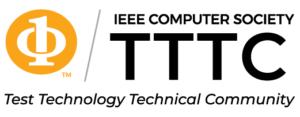Corporate supporters
Sponsors
The IEEE promotes the engineering process of creating, developing, integrating, sharing, and applying knowledge about electronic and information technologies and sciences for the benefit of humanity and the profession.
The Council on Electronic Design Automation (CEDA) was established to foster design automation of electronic circuits and systems at all levels. The Council’s field of interest spans the theory, implementation, and use of EDA/CAD tools to design integrated electronic circuits and systems. This includes tools that automate all levels of the design, analysis, and verification of hardware and embedded software up to and including complete working systems. CEDA enables the exchange of technical information by means of publications, conferences, workshops, and volunteer activities.
TTTC’s goals are to contribute to our members’ professional development and advancement, to help them solve engineering problems in electronic test, and to help advance the state-of-the art. In particular, TTTC aims at facilitating the knowledge flow in an integrated manner, to ensure overall quality in terms of technical excellence, fairness, openness, and equal opportunities.



